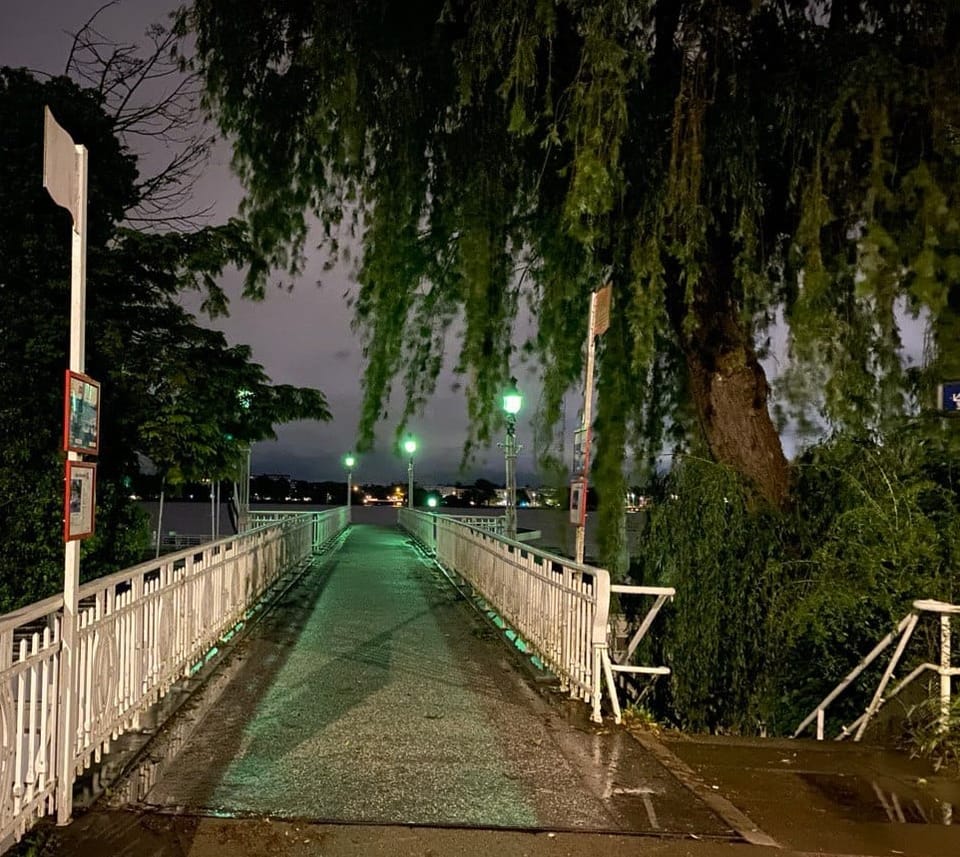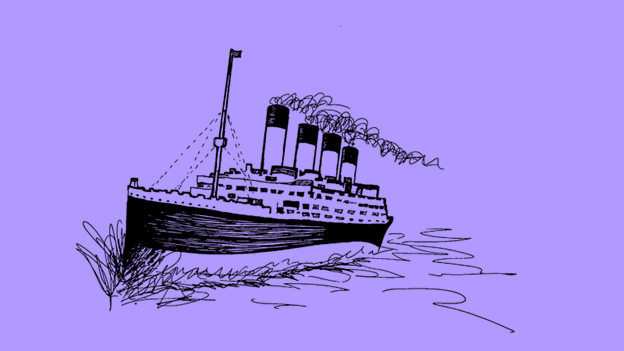One a.m. in Rotherbaum

I turn the deadbolt in painstakingly slow motion through two and a half revolutions, and release the handle on the outside of our apartment door. I hold my breath and listen. No sound from inside—I haven’t woken Danny. I pick my way down the creaky old staircase and out the building. It’s only when I shove the front door open that I realize my contacts are out and I haven’t grabbed my glasses. Too late. No going back now.
It’s been raining off and on all day. Now, a breeze keeps the wet trees dripping through the misty air. With my fuzzy eyesight, everything looks soft around the edges. The square paving stones of the sidewalk glisten—smoother than I know they are in real life—with puddles reflecting the streetlamps’ glow. They form a trail leading down the block into the dark. It looks like the start of an adventure, albeit one tinged with danger. What will I find, out alone in Hamburg on a Wednesday at 1 a.m.?
When we’d turned out the light nearly three hours earlier, my body felt spent, but my brain wouldn’t turn off. My right ankle itched. Sweat beaded on my arms under the duvet. My mind cycled through an email I needed to write, the latest bad news from the U.S., my next essay, the White Lotus, and back to that email. I’d gotten up and sat quietly on the easy chair in the corner for 20 minutes in the dark. I’d gone back to bed, listening to Danny purr rhythmically, and worked through the email, politics, essay, etcetera again.
Sleeplessness isn’t unusual for me. Getting out of bed is. And leaving the house would never even have occurred to me back home. But tonight, I decided to try something new.
Outside, my feet take me to the Grand Elysée hotel down the street. I gaze up at its seven stories of brick looming in the dark and peer at the taillights of the taxi stand by the side entrance. Their red glow is comforting, a sign of other human life out here in the cold. I study the hotel’s revolving door. I know the ground floor, I know where there are comfy chairs far from the sight lines of the reception desk, where I could sit almost certain no one would bother or question me. But I don’t move. I stand there, listening to the still city, as though waiting.
There’s something about being here—a temporary immigrant in a foreign place, removed from the reality of life back home—that’s seemed to dial up my tendency toward flights of fancy. I’ll be walking to my office in the morning, and be struck by the possibility of skipping my next meeting for a museum instead. Coming home to make dinner, I’ll realize I could walk right past the apartment, on down the street to Dammtor station, and hop on the overnight train to Zurich. As I brush my teeth before bed, I’ll picture myself throwing on a button-down and dancing ‘til late in the clubs of the Reeperbahn instead. It’s not that I want to do these things particularly, at least not in every case. It’s the sense that I could that gives me a tingly feeling of possibility—and a touch of anxiety.
I don’t know why I am this way: I get antsy if any one day is too similar to the one before, get this nervous notion that life is passing me by and I’m missing out on adventure. Today was a regular old work day—home, office, home, dinner, TV, bed—and tomorrow will be, too. Perhaps that’s why I’m out here tonight.
When we first arrived in January, the Grand Elysée was covered in a light dusting of snow—rare for Hamburg—the trees in the park outside mostly bare, the sky above it gray. For five months, the hotel has been a subtle marker of the changing of the seasons. In February, the grass erupted green. In March, a shock of purple crocuses sprouted and the hotel put benches out on the sidewalk. In April, signs advertised the rooftop bar now open 7 days a week. In May, guests at the hotel breakfast spilled outdoors onto the patio. The steady progression of time, a sort of seasonal metronome. But in the dark damp of a late-spring night, it could be any time of year again.
I stare up at the hotel for perhaps five minutes. Then, abruptly, I turn on my heel and stride down the dark side street, past the taxi stand, toward Alster Lake.
With my vision blurred, my other senses are heightened, just a bit. I notice the chill on my fingertips where they poke out the ends of my rain jacket, and the stickiness of its cheap plastic against my wrists. The wet leaves on the trees whisper rumors in the night breeze. I catch the perfumes of flowers I can’t name, flowers I ordinarily wouldn’t even notice in daylight if Danny didn’t stop me to point them out. An electric whirring pricks the night and quickly grows closer. A couple passes on two scooters, chatting with the tipsy energy of a springtime date night run deliriously late. They glow under a nearby streetlamp before disappearing out of range.
I’ve walked this route plenty of times during the day, when it’s packed with the bustle of life. But now, with my blurred vision and the empty streets, the everyday holds just a tinge of the sinister. As I pass the neighborhood police booth outside the Turkish embassy, my heart quickens. I’m doing nothing wrong, of course, but what if they don’t know that? I left my passport back upstairs. The two officers chatting, animated, don’t seem to notice me. Just to be safe, I wait at the crosswalk for the interminable light to change—Danny’s warned me they ticket you for jaywalking here. And besides, across the street I can make out a tall figure loping unsteadily in the way that signals, even without my contacts, someone many drinks deep. I silently mouth “keep moving, don’t turn toward the lake, keep moving,” and he does. The light changes and I continue alone.
I’m surprised to find the path around the lake deserted, its damp dirt stamped down from a day of commuters and daydreamers long since gone to bed. I don’t know what I expected—midnight joggers, perhaps, or lovers concluding a long successful date wrapped around each other on a bench. I walk a few paces and discover I’m wrong: a mama goose is frozen in the middle of the path, babies beside her. She does not look keen on letting me pass. I stop a couple meters back and wait for her to move. She stares at me, unflinching. I imagine her rushing me, pecking, beating my scalp with her wings. I step off the path, into the wet grass, and circumnavigate her slowly, no sudden movements. I look back. She still hasn’t moved.
May is turning to June. I can feel the change in the breeze off the water. It’s that time of year that ordinarily feels unhurried and expansive, flush with the promise of a full summer ahead. But here, now, time is a hook behind my navel pulling me forward. One month left here. Life in Hamburg has been wonderful, and I’ve been slowly realizing: I don’t want to go home. This walk around the Alster is probably not my last, but it’s definitely one of the last. I want to dig my heels into this path, to resist time’s leash, or at least slow its pull. But that’s not how time works.
A steady rumble wafts across the lake, and I step a few paces down to the water's edge and peer into it, hoping for a big boat going by. It’s just the S-Bahn train trundling over the bridge to the Hauptbahnhof. I didn’t even know it ran this late. Its handful of weary passengers must be squinting under too-bright lights on their way to their beds in whatever corner of Hamburg they call home. There’s still so much of this city I haven’t seen, still so much to do here, and we’re running out of time to do it.
A shadow jumps on the path in front of me and I halt, quivering. It’s just an actual shadow: a rogue tree branch waving in a sudden gust of wind and catching the light of a streetlamp. I look up and whisper thank you to it, then stand very still for a minute, elbows folded to cradle my stomach, calming my nerves.
I come upon Bodo’s Bootssteg, the little cafe on the water that I walk past all the time but have never entered. It’s dark now, of course. Next to it is the bridge down to the Alsterdampfer ferry pier, and the little overlook where tourists take selfies above the water. At twilight, its row of lampposts turns on, glowing green like lanterns on white poles. They’re unlike any I’ve seen elsewhere in this city, and they captivate me every time.
Tonight, as I stare at their dim green light against the black water and sky, I see a Long Island pier thousands of miles across the Atlantic, a fictional one that I can nevertheless picture perfectly in my mind. I remember Gatsby’s final line: So we beat on, boats against the current, borne back ceaselessly into the past.
No, I think, it’s not like that at all. Time is a current that’s pulling me forward, and I want to beat against it.
Or is it? My nose is cold and my brain feels heavy now, and I can’t tell if this is insight or idiocy. I shake my head. Whichever way it is, I think, Fitzgerald’s right: time pulls me forward, and memory pulls me back, and I can’t beat either of them anyway.
This is my turnaround point. I hadn’t intended it, but I know it now that I see it.
The breeze makes the waves lap at the lake’s edge, the whispers in the trees sound sleepy now, and the puddles in the sidewalk form a trail through the dark back to my bed. Enough adventuring in the world of alternate possibilities for one night. My fuzzy vision has turned bleary and my mind is slowing. We still have time here, I think. Once I’m home, after the adrenaline rush of the walk has subsided, I’ll be able to fall asleep. And morning will bring the everyday adventure of our last month before our German sojourn comes to a close, before we return to America, and whatever happens after that, and after that, and after that.

Member discussion